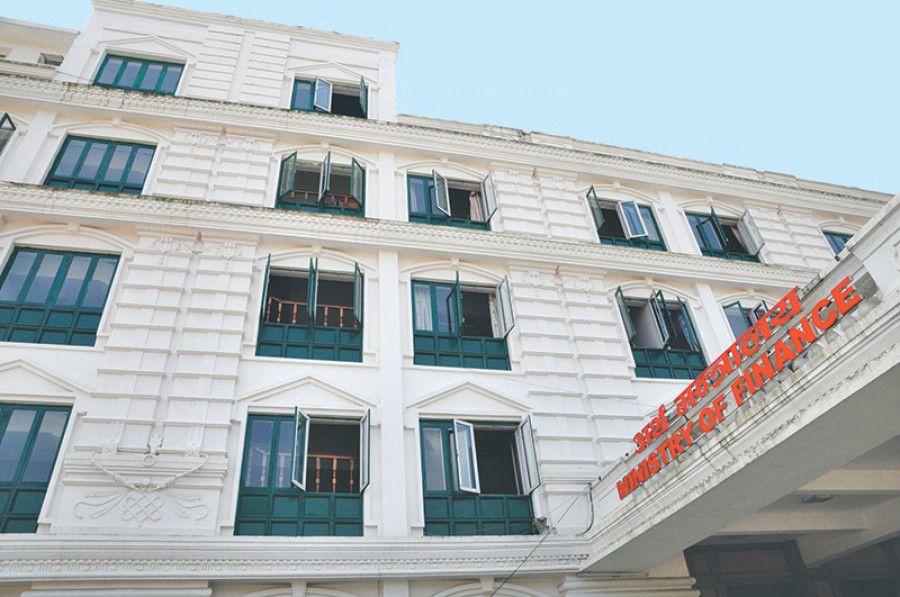National
Plan to call bids for all projects by mid-August fails
Officials cite incomplete preparatory works, uncleared past liabilities, and restrictions on movement due to Covid-19 as reasons for delay.
Prithvi Man Shrestha
The Road Division Office in Hetauda has called for tenders for just a single project out of more than 30 despite the Ministry of Finance directive to do so by mid-August.
And no other government agency fares better.
In the budget implementation guidelines issued in mid-July, the Finance Ministry had asked government agencies to call tenders after completing preparatory tasks like annual procurement plan, detailed design and cost estimate.
Contracts are to be awarded by mid-October and work should begin within 15 days of awarding the contract.
This is in line with the constitutional provision of having the budget for the new fiscal year announced by the end of May (Jestha 15 according to the Nepali calendar) so that capital expenditures are not made at the fag end of the fiscal year.
“We could not meet this deadline because necessary preparations could not be completed in some of the projects because of the current Covid-19 situation as movement of people has been restricted in Makawanpur, Bara and Parsa,” said Suman Yogesh, chief of Road Division Office in Hetauda.
Despite the intentions of the constitution, this means the trend of earlier years is likely to continue.
In the fiscal year 2018-19, 23.72 percent of the capital budget was spent in the last one month, according to the 57th annual report of the Office of the Auditor General. In the last week of that fiscal year alone, 14.7 percent of the total capital expenditure budget was spent.
In the last fiscal 2019-20, only 17 percent of the capital budget was spent by mid-January 2020 while overall expenditure until that period was 28 percent of the total allocated budget.
Work done at the last minute results in a compromise in the quality of work, according to Tulasi Sitaula, former secretary at the Physical Infrastructure Ministry.
A large chunk of the budget spent in the last few months and the budget spent in the rainy season results in wasted spending, he said.
This year the Department of Water Supply and Sewage will also miss the mid-August deadline. Although it has more than 40 projects to put out to tender, it has so far called bids for only about five projects.
“We also need to ensure resources for the projects from the finance ministry before announcing the tender,” said Sunil Kumar Das, director general at the department. “We can call two more tenders at most by August 16.”
According to Das, the Finance Ministry directive says that new contracts should not be awarded on projects that were not completed in the last fiscal year.
He said that the department planned to call the maximum number of tenders by the first four months of the current fiscal year.
According to the Department of Roads, which has the largest capital expenditure budget, it has around 1,000 local level roads and around 1,100 bridge projects to put out to tender. These are mostly continuation of projects from past years but budgets are allocated for different parts of a project every year.
Ironically, even as they are past projects, the tender process is being delayed. As per the Ministry of Finance directive, new tenders cannot be called in projects whose liability has not been cleared, according to the Department of Roads.
“Outstanding dues could not be cleared because of the lockdown and poor work progress, among other things,” said Arjun Suwal, information officer at the department. “About 800 road projects have liabilities to contractors to be cleared from the last fiscal year.”
“We can call tenders soon only for about 200 road projects,” Suwal said.
But, most of the development works remained suspended due to the Covid-19 pandemic since the lockdown was enforced on March 24, which lasted till July 21. As a result, the capital budget expenditure remained less than 50 percent.
Last fiscal year, only Rs191 billion of the Rs408 billion allocated for capital expenditure was spent, according to the Ministry of Finance.
The government’s procedural delays in the early months of the fiscal year result in development works carried out only in later months and result in a compromise in quality, officials said.
But calling for bids by mid-August is not as simple as it sounds.
Inviting tenders by mid-August is challenging because conducting detailed designs during the monsoon period for the process is challenging, said Tulasi Sitaula, former secretary at the Ministry of Physical Infrastructure and Transport.
However, according to him, the Ministry of Finance directive was a step in the right direction to bring forward the whole cycle of project implementation. “In the past, when the annual budget was presented in July, government agencies used to call for tenders only by mid-December,” he said.
But if things for Yogesh at the Road Division Office in Hetauda go to the plan, the constitutional provision may bear fruit. “I am preparing to issue tenders by the end of August for the projects under this office,” he said.




 9.6°C Kathmandu
9.6°C Kathmandu














